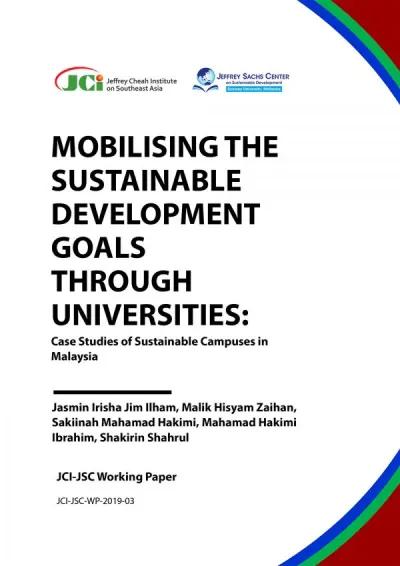
JCI-JSC-WP-2019-03: Mobilising the Sustainable Development Goals Through Universities: Case Studies of Sustainable Campuses in Malaysia
Publication date: August 2019 | Length of paper: 19 pages | ISBN: 978-967-5492-16-7
The 2030 Agenda, as adopted by the United Nations General Assembly, paves the way forward for planet, people and prosperity—an Agenda that replaced the Millennium Development Goals with the Sustainable Development Goals (SDGs). The SDGs consist of 17 goals, 169 targets and 232 indicators. Essentially the goals exist to address sustainability holistically, covering all dimensions including economic, social, cultural and ecological aspects. The United Nations has identified Goal 4: Quality Education as one of the main drivers in achieving the Agenda. This paper focuses specifically on Target 4.7: Education for sustainable development and global citizenship. Universities play a vital role in engaging youth and generating knowledge and expertise in understanding and implementing the SDGs. This paper explores the role of universities in ensuring the SDGs are met, as a mobilising catalyst for accelerated implementation, as well as case studies of sustainable campuses in Malaysia that showcase the community and student outreach projects, in line with the SDGs, such as the Bicycle Project at the University of Nottingham, Malaysia Campus, Kompos to Kelulut (K2K) at the Universiti Sains Malaysia and Sunway Youth for Sustainable Development at Sunway University. The case studies show that education goes beyond the formal curricula, emphasising on soft skills and critical thinking – a major component of and contributor towards proenvironmental behaviour. A set of recommendations are included to address limitations in the study.
Download
Author(s)
Malik Hisyam Zaihan
Sakiinah Mahamad Hakimi
Mahamad Hakimi Ibrahim
Shakirin Shahrul
Jasmin Irisha Jim Ilham
The JCI-JSC Working Paper series is published to disseminate preliminary research findings and stimulate intellectual discourse on wide-ranging public policy issues, ranging from security to sustainability. The views expressed herein are those of the author(s) and do not necessarily reflect the views of the Jeffrey Cheah Institute on Southeast Asia and the Jeffrey Sachs Center on Sustainable Development.



